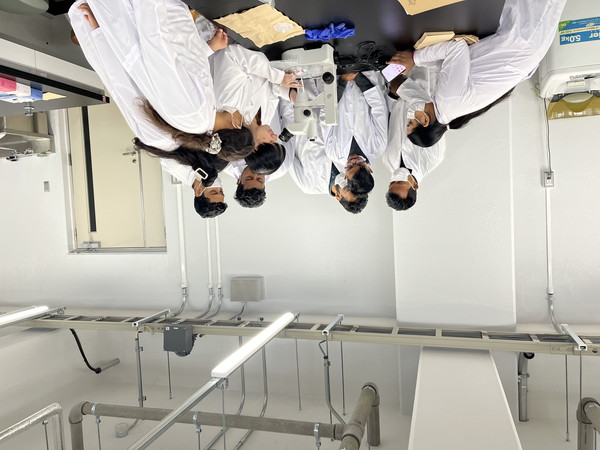Short summary about Covid-19 in Cambodia

Bunna CHEA, MSc, DVM,
Lecturer, Faculty of Veterinary Medicine,
Royal University of Agriculture, Phnom Penh, Cambodia
The new pandemic, also known as Covid-19, which is caused by the coronavirus SARS-CoV-2, has brought the world, including Cambodia, many challenges. The rapid spread of Covid-19 in Cambodia has resulted in a total of 98,842 infected people with 2,028 deaths by September 10, 2021. On the same date, there were 658 newly confirmed cases with 499 reported to have recovered, and 9 deaths. The virus found in Cambodia has include the Alpha, Beta, and Delta variants. Delta variant has been reported to have spread across our country recently. Insufficient health facilities has posed to be the biggest problem. To overcome this pandemic, the government has been working really hard from the national to local level leading to lockdown, restrictions and vaccination to prevent and control the new coronavirus.
Lockdown has been implemented with 3 levels, considering the number of infected and confirmed cases for geographic areas ranging from the specific locations to district levels. Shut down of the schools has been made across the country leading to challenges for the schools and students, who found difficulty in educating and studying. Students who live in the city and town start to have online classes. However, for those who live in the rural areas, the class starts with the given homework/lesson but some may not be able to take those lessons at all. Employees of government and private sectors have been restricted from going to their workplace but were allowed to do so only after presenting their vaccination card. During the lockdown, the Cambodian government pays for the quarantine and treatment of all infected people, irrespective of their age. Charity organizations, including NGO/private companies as well as the privileged and wealthy people, had also contributed generously in term of cash and goods to those who were affected by the pandemic. Goods provided by the charity organizations includes disease prevention kits such as face masks and alcohol gel, and also foodstuffs.
The Ministry of Health of the Royal government has approved some medicine for use against Covid, including Non-steroid anti-inflammatory drugs (NSAIDs), Corticosteroids and antibiotics for either treatment at home treatment or at the hospital. Paracetamol has been approved to reduce fever and pain, dexamethasone and prednisone/hydrocortisone are used for severe cases, and broad-spectrum antibiotics are also approved. There has been no approval yet by the government for any traditional medicine to be used against Covid-19.
Business restriction has been imposed on hotels, restaurants, bars, resorts, sport sites, markets, alcohol sales, and some other public gathering places. To prevent the spread of Covid-19 across the country, fines were imposed on those whose activities do not follow the rules and regulations set by the government. For those who failed to wear a mask, they could be fined from US$50-US$250. During the peak of the outbreak, punishment was also meted out for unapproved travelling, public gathering, and other non-approved businesses. The monetary fine ranged from US$600 to US$1250.
Vaccination program against Covid-19 has been carried out in Cambodia. Several vaccines have been used, including Sinopharm, Sinovac, AstraZeneca (Covishield from India, and also those manufactured in Japan and UK) and Janssen (Johnson & Johnson). All the vaccines were officially used to vaccinate people who age are more than 18 years old. After a vigorous vaccination campaign, total vaccination of the targeted population has almost been achieved. The vaccination program has now turn to young people, who are between 12-18 years old, starting in August 2021. By 10 February to 11 September 2021, vaccination rate has reached 71.44% of the targeted 16 million people; 97.23% in the population of more than 18 years-old in the targeted 10 million people and 86.77% of about 2 million people who are 12-18 of age. With the support from the various organizations and the donation from the government, vaccination is provided with free for everybody in the country. Since Delta variant has become widespread across our country recently, the government has decided to add booster dose for all health professionals, officials participating in preventing and controlling Covid-19, and officials at ministries / provincial level. These people have basically been vaccinated previously with Sinovac/Sinopharm/AstraZeneca vaccine.
Currently, the government introduces the use of both Rapid antigen test kits and PCR testing to diagnose suspected people. The Rapid test kits are available at both public health centers and private clinics. Test using the Rapid test kits are provided free for people going to the public health centers/screen test sites. However, one has to pay for the test kit when being diagnosed at the private clinic or wanting to do the test at home. One has to pay for the PCR testing if they want to get an official Covid-19 test result to go abroad and for some other cases when the document is required. However, it is free for those who has been suspected to be infected, after confirming using the Rapid test, which may turn out to be either negative or positive, as well as in combination with the contact history involving infected people, in addition to consulting with health professional at public health centers/screen test sites.
I think the good lesson that the pandemic has taught us is to overcome problems with current available resources and capacities, collaboration and engagement with others, to find a solution. New living style has been adopted. The bad things are the occurrence of the economic crisis across the various sectors including agricultural farmers, livestock farmers, industries and other business, which could have bad impact for individual to groups/organizations. The social and traditional celebrations, and people to people relationships have been challenged. Also, the psychological effect across the age groups is another big problem. I think our government has made much efforts to prevent the escalations and considerably control the situations to lessen the impact of the Covid-19 in Cambodia.






